Updates, News & Resources

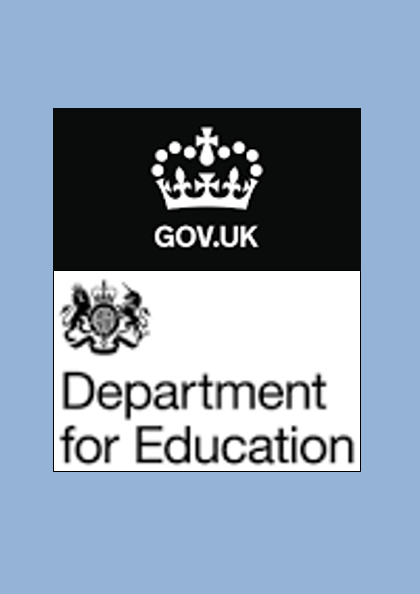
DfE – SEND Guidance for School Governing Boards
The DfE has published Special educational needs (SEN) and disabilities: guidance for school governing boards on 3 February 2025. The guidance is intended for boards of both maintained schools and academy trusts to:
- support school governing boards’ understanding of their role and responsibilities in relation to children and young people with special educational needs (SEN) and disabilities
- empower governors and trustees to hold their schools to account
The board is the decision-making body of the school and is accountable and responsible for what the school does. It is vital that boards play an active role in providing support and challenge, to ensure schools are providing the best support for pupils with SEN and disabilities.
The guidance can be downloaded directly from the www.gov.uk website using the following LINK
Bolton Governance Services have provided a role descriptor for the nominated governance lead for SEND through the Clerking and Support Service. This is available via your Clerk or Governance Professional.
Wraparound Childcare Programme: Supporting Families and Strengthening Schools
Wraparound childcare provides before and after school childcare from 8am to 6pm during term time for school-aged children from reception to year 6.
As part of the national wraparound childcare programme, Bolton Local Authority has additional funding to contribute to set-up or expansion costs, and running costs, of new provision, to remove any financial risk while demand is built. The funding is not aimed at covering the costs of delivering wraparound childcare in the long term but should cover costs in the set-up or expansion phase.
If you would like to explore how your school can benefit from the wraparound childcare programme, further information is available to download here (select the download button)

DfE Guidance: Use of reasonable force in schools
The Department for Education has reviewed its guidance about the use of physical restraint in schools for governing bodies, headteachers and school staff.
This guidance provides clarification on the use of force:
- to help school staff feel more confident about using reasonable force when they feel it is necessary
- to make clear the responsibilities of school leaders and governing bodies in respect of this power
The guidance can be downloaded directly from the DfE website using the following LINK

What Does the Budget 2024 Mean for Education
The Chancellor has recently announced the government’s Budget for 2025-26. The Budget is the point at which the amount of money the government spends on public services like health and education is decided.
The DfE Education hub blog explains what this year’s Budget means for early years providers, schools, colleges and children’s social care.
The blog can be viewed directly from the www.gov.uk website by following this LINK
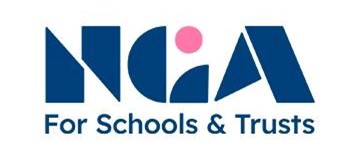
A whole School Approach to Food – Free E Learning
The NGA (The National Governance Association) have announced the release of a whole-school approach to food e-learning session developed with the Department for Education.
You don’t have to be a Learning Link subscriber to benefit from this learning – the module is free to all governors and trustees, providing essential guidance on the legal requirements and best practices around the School Food Standards, the board’s oversight responsibilities, creating policies, and effectively monitoring school food provision.
The module is free of charge via the NGA trial site via the following LINK
If you subscribe to Learning Link you can access it in the usual way on the platform.
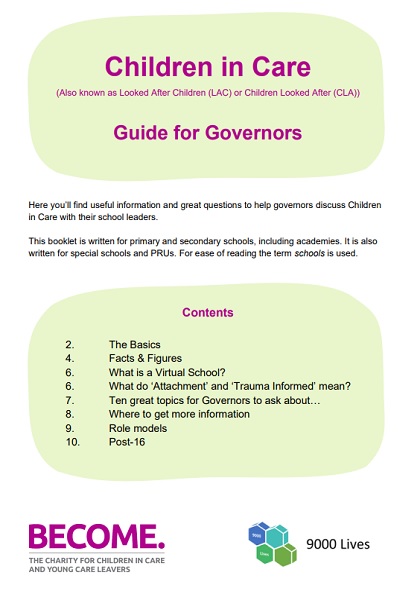
Children in Care: Guide for Governors & Trustees 2024
BECOME, a charity for children in care and young care leavers, in partnership with Aaron King (9000 Lives.org) have revised the Children in Care, Guide for school governors and trustees for the current 2024/25 year.
This is a short handbook to advise governors and trustees what they need to know about children in care (CIC). It explains the basics quickly and clearly, as well as giving sensible questions for governors to ask of their leaders.
BECOME use the term ‘children in care’ (or CIC for short). However, these same young people are sometimes described as Looked After Children (LAC) or Children Looked After (CLA).
The guidance can be gained directly from the BECOME charity website, using the following LINK
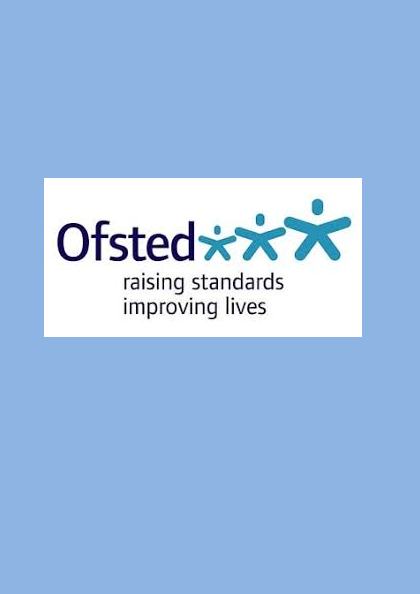
School Inspection Handbook 2024
Ofsted has published a revised School Inspection Handbook which was published on 16 September 2024.
Single headline gradings have been removed but grading of the four areas across the existing categories: quality of education, behaviour and attitudes, personal development and leadership and management, have been maintained. There has also been a “suspend and return” approach for safeguarding concerns, allowing schools time to address issues before a final judgment is made. Schools will now be notified of upcoming inspections at approximately 2pm on the Monday of the week that the inspection is scheduled to begin.
Details of the updates can be found in the new School Inspection Handbook, which includes responses from ‘The Big Listen’ consultation, held earlier in the year. The Handbook can be accessed via the www.gov.uk website using the following LINK
The full summary of changes can be accessed via the www.gov.uk website using the following LINK

Keeping Children Safe in Education 2024
The DfE (Department for Education) has updated its Keeping Children Safe in Education guidance. The statutory guidance, which comes into effect from 2 September 2024, applies to all schools and academies and sets out the legal duties that must be followed to safeguard and promote the welfare of children and young people under the age of 18 in schools and colleges.
The full table of substantive changes, may be found at Annex F of the Keeping Children Safe in Education document; however, the following changes are highlighted:
- Definition of ‘safeguarding and promoting the welfare of children’ – amended to reflect the duties that relate to school and college staff within the updated ‘Working together to safeguard children 2023’
- ‘Early help’ – amended to reflect the duties which apply to school and college staff within the revised ‘Working Together’ guidance
- When talking about abuse and neglect – ‘exploitation’ has also been added throughout the document.
- In relation to ‘Safeguarding Issues’ – ‘deliberately missing education’ has been amended to reflect revised definition of ‘unexplainable and or/persistent absences from education’.
The statutory guidance can be downloaded directly from the www.gov.uk website by following this LINK
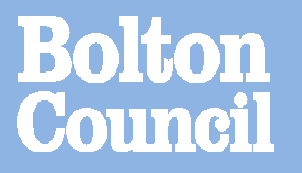
Area SEND Inspection of Bolton Local Area Partnership
Following the Area SEND inspection held in June 2024, Bolton Council are thrilled that services for children with special educational needs and disabilities (SEND) have achieved the highest possible rating from Ofsted and the Care Quality Commission. This exceptional recognition is due to the dedication and quality of our services which is underpinned by our strong partnership between education, health and social care.
The inspection highlighted the positive experiences and outcomes we are achieving for our young people thanks to the creative and imaginative efforts and hard work of our staff.
Inspectors saw that, Local Leaders are passionately ambitious for Children and young people with SEND. Children and young people typically benefit from well-developed services in Bolton…Many children and young people with SEND receive the right help at the right time and …. health, education, and social care professionals work well together and ensure that they know children and young people well. ..Practitioners work together highly effectively. They actively listen, understand and, often, respond imaginatively to children, young people and their families.
Inspectors noted that children are at the centre of local leaders thoughts, planning and decision making.
The Council are delighted that the work of Bolton Parent Carers Forum and the Information Advisory Service is recognised as a strength as we know how tirelessly both services work to support our children, young people and their families. We are immensely proud of our staff and the positive impact that you have on the lives of our children and young people. This achievement is a huge success for us and we look forward to celebrating with you all and thanking you for your commitment, however we are not complacent and we will continually strive to ensure we listen to feedback, respond to recommendations in the report and provide the very best opportunities and outcomes for our children, young people and their families.
Sandra Bruce, Interim Director for Children’s Services
The full report can be found by visiting the www.gov.uk website using the following LINK

Welcome to the Autumn Term 2024
Dear Governor / Trustee
Welcome to the autumn term 2024 and the new school year! I hope you feel rested after the summer break and ready to take on the opportunities and challenges for the year ahead. As usual the Governance Services Team are here to support you in in all matters relating to strategic governance through our clerking, training and development services.
We commence the term with some wonderful news, and we congratulate Rachael Worthington, our Senior Clerking Lead, and her husband on the birth of their latest additional to the family. It’s a girl! The team are all very excited by the news and wish them all the best.
Over the summer period, we sadly said goodbye to Emma Graham who has gained a promotion within the Council. In her relatively short time with the service, Emma has provided excellent support to her boards, and she will be very much missed by the boards she has served and of course her colleagues. We wish her the very best in her new role. The service is therefore recruiting, and we hope to have further information in due course. Alternative arrangements are in place and schools have been notified as such.
We have some new and exciting opportunities through the Governance Training and Development Programme this year with over 30 centre-based courses held on multiple dates and times throughout the year, along with 60 e-learning sessions. All accessible via our competitive SLA and Pay As You Go rates. Highlights include new sessions for Health and Safety, Cyber Security, SEND and Ofsted.
Our annual Governance Conference, will be held on 16 November 2024. The conference theme this year is “Working Together for Wellbeing” and will prove to be an informative and thought-provoking event. As usual, our regular offer of termly Chairs’ Briefings, Partnership Forums and Training and Development Lead Briefings continue to support shared learning and external perspectives.
Finally, don’t forget that the service, through our Development Programme, can provide bespoke learning opportunities for your Board on various governance areas, enabling effective strategic working and promotion of best practice and excellence.
So, from myself and the Team, I want to thank you for your support in 2023/24 and I wish you and your school and governance teams well for the term and year ahead.
John Ashworth | Governance Services Manager | Bolton Council
john.ashworth@bolton.gov.uk | 01204 338601
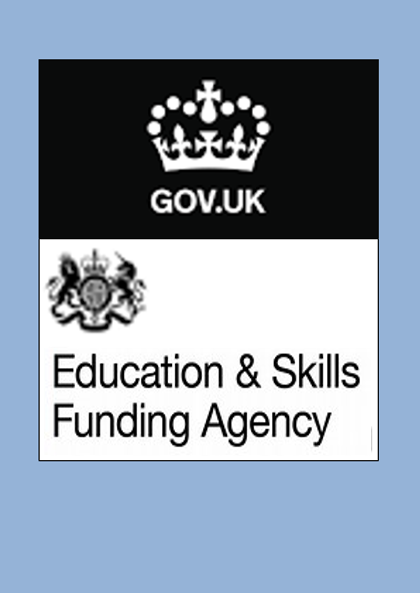
ESFA Academy Trust Handbook 2024
The Education and Skills Funding Agency (ESFA) have published the new Academy Trust Handbook, which comes into effect from 1 September 2024.
The Academy Trust Handbook sets out core governance and financial management obligations, as well as action that may be taken when obligations are not met. The revised handbook contains several key changes, including:
- Reminding trusts the importance of the digital and technology standards
- Emphasising that trusts’ reserves policy includes a clear plan for managing reserves
- Explaining which internal scrutiny options to be applied for trusts with annual revenue income over £50 million
- Clarifying qualifications and/or experience for trustees and peer reviewers
- Confirming that trusts will be able to enter into finance leases where the lease category appears on the DfE approved list
- Clarifying that trusts take appropriate action to meet DfE’s cyber security standards
- Extended the list of examples where a Notice to Improve (NtI) may be issued to include management of the school estate
The ESFA have summarised the changes to the 2024 edition on page 7 of the guidance.
Alongside the Academy Trust Handbook, the Education and Skills Funding Agency (ESFA) have published the Schedule of Musts for 2024. These are the requirements in the Academy Trust Handbook brought together into one list: the ‘musts’.
The Handbook and Schedule of Musts can be downloaded via the www.gov.uk website via the following LINK

DfE Suspension and Permanent Exclusion Guidance 2024
The Department for Education have revised the Suspension and Permanent Exclusion Guidance which comes into effect from 19 August 2024 to include a technical update to reflect the School Attendance (Pupil Registration) (England) Regulations 2024.
The guidance is for maintained schools, academies and pupil referral units in England. The updates are in addition to those already established in the 2023 guidance and reflects the government’s ambition to create high standards of behaviour in schools so that children and young people are protected from disruption and are in a calm, safe, and supportive environment that brings out the best in every pupil.
This guidance provides schools and other bodies involved in this process with information so that they can continue to use suspensions and permanent exclusions appropriately.
The guidance can be downloaded via the www.gov.uk website using the following LINK

DfE Working Together to Improve School Attendance 2024
The Department for Education (DfE) has produced revised guidance to help schools, academy trusts, governing boards, and local authorities maintain high levels of school attendance, including roles and responsibilities.
The guidance applies from August 2024, and aims to:
- help schools, trusts, governing boards and local authorities maintain high levels of school attendance.
- summarise the roles and responsibilities of parents and carers, schools, trusts, governing bodies and local authorities.
- summarise the support that should be provided to families, and to pupils who are persistently or severely absent, or at risk of becoming so.
- provide details of the legal interventions available to schools and local authorities when attendance support does not work, is not engaged with or is not appropriate.
- provide details of what schools are required to record in their attendance and admission register.
Whilst there is no change to policy, there are a number of updates to the guidance, following feedback, which may be found on page 7 of the guidance.
The guidance, summary table of responsibilities, toolkit for schools and model letters can be downloaded directly from the www.gov.uk website by following this LINK
Bolton Schools Forum Election – Summer Term 2024
The Bolton Schools Forum is a key consultation group in all aspects of resourcing schools in relation to school budgets. There are 31 members of the Schools Forum, 23 members are head teachers and governors of maintained schools and academies.
Spring Term Election Outcome
Following the nomination process in the spring term, there were 2 nominees for the 7 positions.
Therefore, we are pleased to report that the nominees as follows, were duly elected:
- Mrs Patti Jones – St Joseph’s RC High School (Secondary Representation)
- Mr Derek Burrows – Spindle Point Primary School (Primary Representation)
Summer Term Election
Following the spring term election, there are now 3 maintained primary, 1 maintained secondary and 1 maintained special governor positions available for election.
The term of office is 4 years to commence from 1 September 2024 (6 January 2025 if a ballot is required) and Maintained Primary School Governors are invited to be nominated to fill the vacant positions. Those governors interested in standing for the positions should complete the attached form, countersigned by the Chair of the Governing Body they are wishing to be nominated by. (email confirmation from the chair is permissible in the absence of a ‘wet’ signature)
The form should be submitted to the LA Schools Finance Team by no later than Friday 19 July 2024 at 4.00 pm. Following receipt of all nominations by the stated closing date and time, if the same number of nominations are received for the positions available, those governors will be duly elected. If, however there are more nominations than the positions available, an election will be held.
Further guidance is enclosed with the nomination form which may be downloaded here (to the left)
Revised In Year Fair Access Protocol for School Admissions – Consultation
Bolton Local Authority are seeking views on revisions to its In Year Fair Access Protocol. The protocol is a statutory requirement of the School Admissions Code (2021) and seeks to support pupils, who have been unable to secure a school place through the usual in year admissions route, to find a school place quickly. The protocol ensures that these pupils are fairly and equally distributed between schools.
Changes have been made to the decision-making process within the protocol to strengthen the process and ensure this fair and equal distribution of pupils.
A period of consultation on the revised protocol is taking place between Friday 26 April and Friday 24 May 2024. Views are being sought from schools, governing bodies and academy trusts. A copy of the proposed new protocol is attached.
Please send any comments for inclusion in the consultation to admissions@bolton.gov.uk marking the email with the subject ‘IYFA protocols’ by 24 May 2024.

New DfE Governance Guides
The Department for Education (DfE) has replaced The Governance Handbook with two new governance guides. It is important to note that the guides do not introduce new policy and are aimed to be shorter and more accessible. The existing Governance Handbook, Competency Framework and Governance Structures and Role Descriptors have now been archived.
Any critical information will be captured in either the Governance Guides or the Academies Trust Handbook, whichever is most appropriate.
The guides can be accessed via the following links:
Maintained Schools Governance Guidance
Academy Trust Governance Guidance

Mobile Phones in Schools Guidance
The Department for Education (DfE) have published guidance and a toolkit for individual schools and trusts on how to develop, implement and maintain a policy that prohibits the use of mobile phones throughout the school day.
This non-statutory guidance should be considered alongside the behaviour in schools guidance which supports schools in establishing calm, safe and supportive environments conducive to teaching, and keeping children safe in education. This guidance should not be taken as a complete or definitive statement of the law nor as a substitute for the relevant legislation and legal advice should be sought as appropriate.
The guidance can be found via the www.gov.uk website, using the following LINK
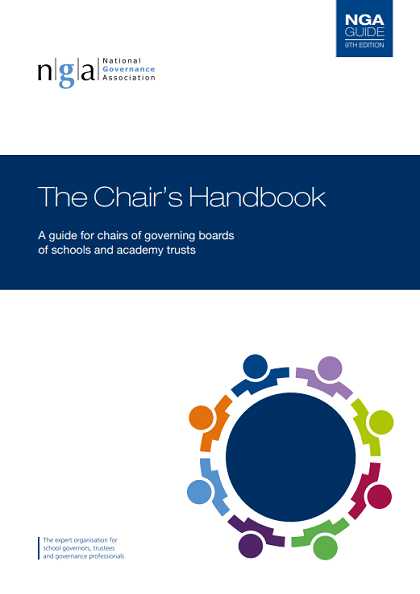
Welcome to Chairing in Bolton
Have you recently been elected as the Chair of Governors, Local Board or Trust? Have you received your ‘Bolton Welcome to Chairing’ pack?
As part of the Clerking and Support Service, all new and recently elected Chairs receive the pack which provides information on the support available to Chairs in Bolton as well as a complimentary copy of the NGA Chair’s Handbook. (usually priced at £16 per copy) The Chair’s Handbook is essential reading for those leading and aspiring to lead governing boards and committees in all types of school structure, as well as other executive leaders working with chairs of boards. The handbook covers:
- leading governance in schools
- becoming the chair
- leading and developing the team
- working with executive leaders
- leading improvement
- leading board business
If you have not yet received your Welcome to Chairing pack, please contact your Clerk to Governors/Governance Professional directly or via the team email at governance.services@bolton.gov.uk
Bolton Schools Forum – Election 2024
The Bolton Schools Forum is a key consultation group in all aspects of resourcing schools in relation to school budgets. There are 31 members of the Schools Forum, 23 members are head teachers and governors of maintained schools and academies.
Of the representatives there are currently 4 maintained primary, 2 maintained secondary and 1 maintained special governor positions available for election.
The term of office is 4 years to commence from 15 April 2024 (1 September 2024 if a ballot is required) and Maintained Primary School Governors are invited to be nominated to fill the vacant positions. Those governors interested in standing for the positions should complete the attached form, countersigned by the Chair of the Governing Body they are wishing to be nominated by. (email confirmation from the chair is permissible in the absence of a ‘wet’ signature)
The form should be submitted to the LA Schools Finance Team by no later than Thursday 28 March 2024 at 4.00 pm. Following receipt of all nominations by the stated closing date and time, if the same number of nominations are received for the positions available, those governors will be duly elected. If, however there are more nominations than the positions available, an election will be held.
Further guidance is enclosed with the nomination form which may be downloaded here (to the left)

National School Governors’ Awareness Day – Thursday 29 February 2024
The National School Governors’ Awareness Day will take place this year on Thursday 29 February 2024.
The free online event showcases governance, celebrates commitment and enhances recruitment of new governors. Your free digital pass enables you to access all sessions throughout the day.
The exciting programme of events, throughout the day will focus on the governance of inclusion in 2024. You will explore, with expert speakers, key aspects of education and school life where governance has a role to play in ensuring that their school or trust is inclusive of all, embracing the diversity of its community, delivering equality and equity for all.
This event is advertised via the National Co-ordinators of Governance Services, to which Bolton Governance Services is a regional member.
For further information and to book your free place for the online event, please access the following LINK




